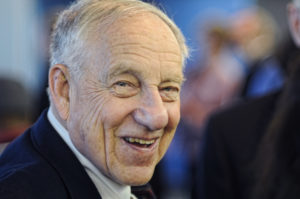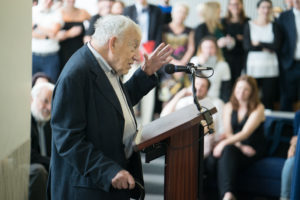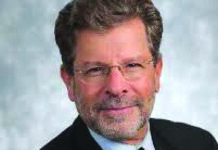
Elihu Katz, the University of Pennsylvania professor who brought television to Israel, died on Dec. 31.
He was 95.
Born in Brooklyn in 1926 to Jewish parents of Eastern European descent, Katz became a sociologist and media scholar whose insights shaped his field. According to colleagues, his biggest one was arguably about “the social context of communication,” as Penn professor Joseph Turow put it.
Katz theorized that “a lot of information people get from the media they get from people who have heard or listened to the media,” Turow explained.
After communication issues during the Six-Day War, “Israeli officials decided in 1967 to expand the nation’s broadcast presence beyond radio,” said an obituary to Katz on Penn’s website. Katz left two academic appointments to head up the effort. Today, Israel has a wide-ranging television ecosystem.
The professor served in a variety of academic appointments before arriving at Penn’s Annenberg School for Communication in 1993. He remained in Philadelphia until he retired in 2014.
“He was very much responsible for positioning the field of communication as something that could be studied in the university arena,” said Barbie Zelizer, Penn’s Raymond Williams Professor of Communication.
Before Katz, Zelizer explained, “communication was run by the idea that the media had large effects.” Katz, though, argued that those effects weren’t so large after all.
The popular notion that the mass media had a pacifying impact on people was not quite right. There was an activating element, too, according to Zelizer.
People consumed the media and then talked to each other about it. A person’s social circle had perhaps as much influence as the content itself.
“That set in place a new paradigm for thinking about how the media works,” Zelizer said.
Katz applied the same concept to studying physicians and how they chose their medicines for patients. And he came to a similar finding: Doctors’ “peer network relationships with their communities” had quite a bit of influence, said Damon Centola, Penn’s Elihu Katz Professor in the Annenberg School.
The scholar also pioneered other media theories, like one about how the media created events, including inaugurations, royal weddings and Olympic competitions, for people to partake in from far-flung locations.

“This is a big legacy,” Turow said.
Katz graduated from Midwood High School in 1944 and then served in the Army for three years. He earned his B.A. and M.A. from Columbia University in Manhattan in 1948 and ’50, respectively.
The scholar published “Personal Influence: The Part Played by People in the Flow of Mass Communication,” about his seminal theory, five years after that. A decade later, he established the Communications Institute at the Hebrew University of Jerusalem.
He left both that post and a concurrent one at the University of Chicago to help introduce TV in Israel. For three years, he ran Israel Television, the Jewish state’s “nascent television service,” the Penn obit said.
After his groundbreaking work, Katz returned to Hebrew University and later added a post at the University of Southern California’s Annenberg School for Communication, where he remained until taking the Penn post in 1993.
Some of his other influential works included “Medical Innovation: A Diffusion Study,” “The Export of Meaning: Cross-Cultural Readings of Dallas” and “Media Events: The Live Broadcasting of History.”
Katz’s research had a particular influence on Centola, who uses the foundation that his predecessor established to study how social media networks influence actual social networks.
“Now that we understand the role of influence, we look at the patterns of connections,” Centola said. “How movements take off and whether they succeed or fail. How social networks shape that.”
Katz, though, was more than just a great scholar. He was a friend and active listener, according to colleagues.
His curiosity never waned through all his decades in academia.
“I just enjoyed talking with the guy,” Turow said. “We never worked on the same research.”
Zelizer described Katz as interested in “whatever you were doing.” She also said his curiosity was a big part of his success.
“When you lose your curiosity, you lose your ability to reinvent,” Zelizer added.
Katz was conversing with people right up until the end.
Earlier in his 90s, the scholar emailed Centola at 2 a.m. with a series of questions on a paper that the younger man had published.
“He was completely attentive,” Centola said.
On the morning of Dec. 31, around 10:30, he sent Zelizer a concise and lucid email. Then he died around lunchtime.
Katz is survived by his wife, Ruth Katz, a musicologist and professor emerita at Hebrew University, and two sons.
[email protected]; 215-832-0740






